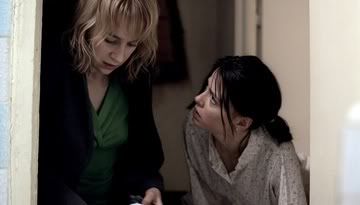4 Months, 3 Weeks and 2 Days (2008)


How is it possible the Academy overlooked this heart-wrenching masterpiece from Romania? It's no surprise that a movie like this didn't come from Hollywood as it touches on a subject that filmmakers around here wouldn't dare to approach with such searing realism. If you want to see a feel-good movie about pregnancy, go see "Juno" because this sure isn't it. "4 Months, 3 Weeks, and 2 Days" is the horrifying story of a college woman helping her roommate obtain an illegal abortion in Communist Romania. It's devastating and yet no lover of great filmmaking will be able to turn away.
Set in 1987 Romania near the end of Nicolae Ceausescu's dictatorship, the movie recreates the feel of being forced to live under totalitarianism by simply following the characters as they move about their world. Cigarettes, among other simple things, must be purchased from the black market, and abortion was illegal not for any moral reasons but, instead, just because Ceausescu wanted more people to control. We first meet Gabita (Laura Vasiliu) as she and her roommate, Otilia (Anamaria Marinca), are packing up to leave for a few days, and neither of them seem happy about it. Even in the first couple of minutes, we begin to not only understand but truly get the feeling of what it must've been like to survive the tired, soul-destroying monotony of living under oppression.
Gabita is the one in need of the abortion, and she doesn't feel any need to take any responsibility for her actions. It's Otilia who ends up doing all the work. She has to raise money for the whole operation and goes to meet the abortionist herself. Gabita nearly botches the whole meeting by not correctly making reservations at the hotel the abortionist specifically requested. This abortionist is named Mr. Bebe (Vlad Ivanov) and he's just as shady as the situation itself. The movie's title refers to the exact amount of time Gabita has been pregnant, and she even lies to Mr. Bebe about that fearing that she may be too far along. Her continuous lying only makes matters worse, and this scene in the hotel room with the insidious Mr. Bebe is as heartless and unpleasant as you could possibly imagine. It's nerve-shattering and something you have to see for yourself.
Otilia is understandably reluctant and frustrated but continues to help her friend in need even if she has problems of her own. These include her boyfriend, Adi (Alex Potocean), who she goes to see, leaving Gabita to wait in bed where any slight movement could wreck her life. Even when Otilia persistently tells Adi that she has to attend personal business with Gabita, he insists that she comes to a dinner party with his family. What follows is an extendedly claustrophobic scene shot up-close of Otilia sitting at the end of an overcrowded table caught in a sea of pointless conversation. Otilia just sits there nervously tensing up and not responding to anything. We've all had similar moments where older adults' conversations seem so far off from anything that's remotely important, but never before like this have I seen it conveyed in a movie. We feel what Otilia feels, and our blood runs cold when the phone rings because, just like her, we know that it could very well be Gabita calling. We wait in agony to know if something went wrong.
Just about every scene in "4 Months, 3 Weeks, and 2 Days" has a significance to it such as the one described above. Director Cristian Mungiu uses mostly static shots, allowing viewers to hunker down and watch the dynamic of the human drama unfold, which makes each and every camera placement crucial. It's an unflinching gaze at the characters, and it allows their emotions to ignite the screen. The starkly beautiful visuals of the movie carry a heavy importance due to an entire lack of any music. The mood is set and sustained through exchanged words, glances, and moments of silence.
Marinca gives a performance that's worthy of awards consideration, simply playing a desperate woman trying to live her life and be a good friend while the government and even her friend make it quite difficult for her. Her character is the center of the action and a lot of meaning is told just through her expressions. Vasiliu, as the helpless best friend, is much different, presenting a woman of self-pity without shining any negative light on her character. No single person is trying to gain the audience's sympathy as we're just there to observe.
This is a rough and complex movie that succeeds in not taking sides. Instead, Mungiu confronts the issue with an unsentimental and honest eye that sheds light and leaves judgment to the viewer. There's an obvious tension on the subject; just look in Marinca's eyes, and you'll see how it's such a readable tension. The movie is grueling and very hard to watch at times but ultimately affecting. The ending scene takes place in the hotel restaurant with Otilia and Gabita sitting across from each other agreeing never to talk about this night again. It gives us a moment to let the resonance of everything to settle in. I was shaken, and there was a point when I was even literally shaking from the intensity. It's rare to come across a film with that sort of power.





No comments:
Post a Comment